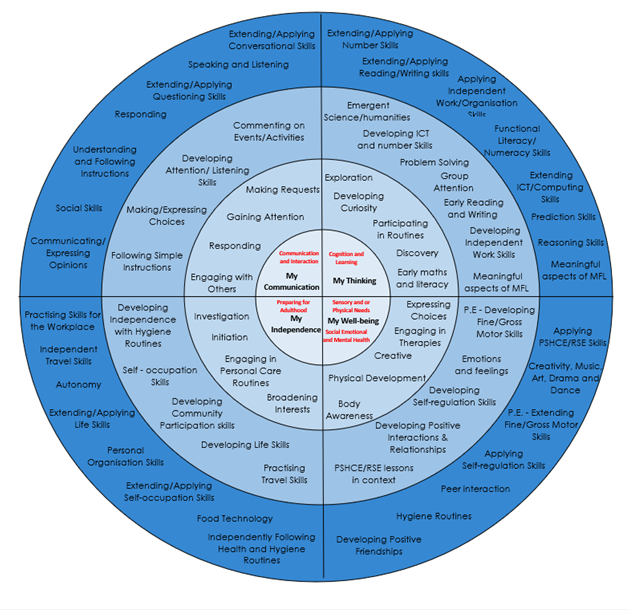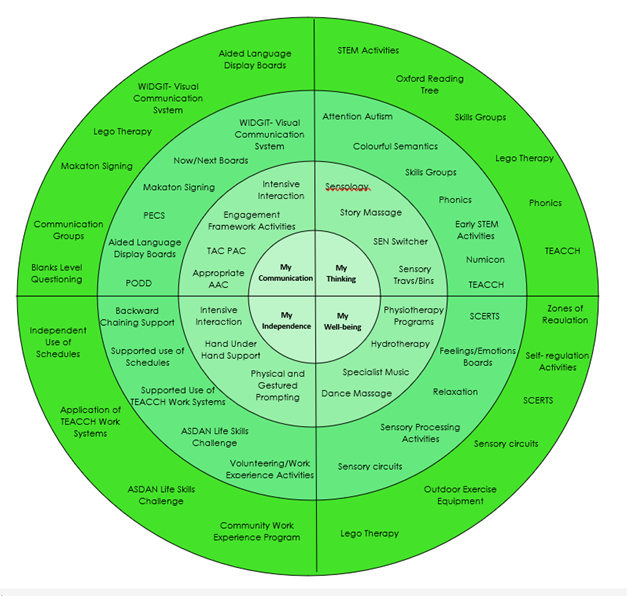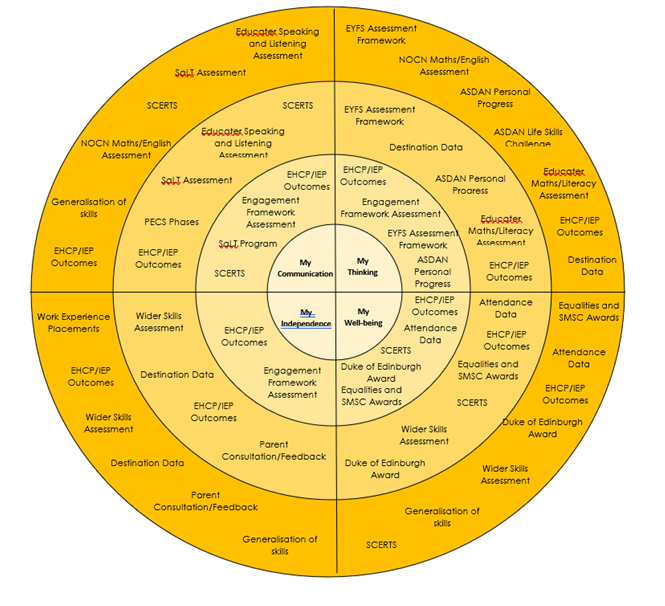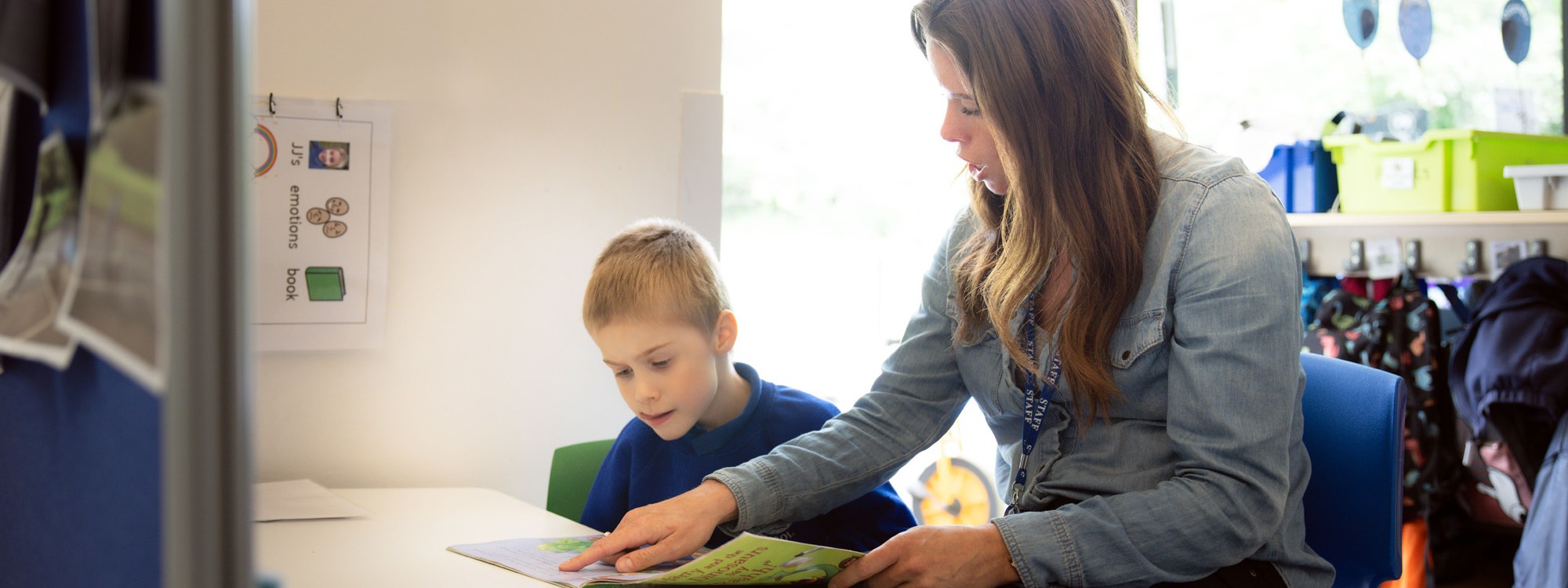- Home
- Our Learning
- Curriculum Overview
Curriculum Overview
Intent
High aspirations for every child/young person (linked to the EHCP four areas of need) are at the heart of Pond Meadow’s vision, values and curriculum. The education we provide is learner driven, meaningful and strongly focuses on preparing pupils for life.
We nurture and enrich every child/young person through progressive and personalised learning experiences in a safe and caring environment.
Our school values underpin all that we do to work towards our vision, and form the foundations of our curriculum: Learning, Respect, Equality and Independence:
Vision: Equipping our learners for life | |
| Learning Teaching the way pupils learn | Intent |
| Respect For everyone, everyday | Implementation |
| Equality Investing in opportunities for all | |
| Independence Prioritising skills for life | Impact |
The following form the foundation of all curriculum delivery:
A Progressive Curriculum with EHCPs at the core
Our curriculum, which is based on the broad aims of the National Curriculum is the vehicle to facilitate pupils to meet their personalised end points based on their EHCP outcomes.
Our curriculum is designed as a cohesive approach, with an individual’s EHCP at the core; facilitating greater involvement of families, the pupil and other professionals in their learning and development.
It offers a broad range of personalised experiences and strategies that build knowledge, core skills and progress towards our aspirations over time. The curriculum at each phase is child centred, always based on each child’s development and needs, their motivation to learn and interests. This best prepares them for the next phase of their education.
INTENT

What does this look like at each phase of education?
Early Years: Our practice is largely informed by the Early Years Foundation Stage which is adapted to meet individual need. We cover the 7 areas of learning and development (communication and language, physical development, personal, social and emotional development, literacy, maths, understanding the world, expressive arts and design) and characteristics of effective learning. There is a focus on understanding nursery and school routines, readiness for learning/accessing groups, functional communication, attention skills, independence and personal care skills. Pupils’ learning is personalised to maximise engagement and progress.
KS1 and KS2: The primary curriculum is based on the National Curriculum and is designed to be progressive from Key Stage 1 to Key Stage 2. Topics in both key stages have been chosen to ensure equally weighted coverage of National Curriculum areas. In Key Stage 1 they focus on areas within pupils own realm of experience and these are broadened at Key Stage 2. Activities are designed to develop functional and life skills alongside early work on independence that builds on the Early Years Foundation Stage.
There is a focus on Literacy, Maths, Science and PSHE (including RHE) which are taught in discreet lessons and have a clear focus for the half-term as well as threading through other curriculum areas. Topic-based work includes cross-curricular work which has learning spread across music, art, geography, history, MFL, ICT, DT and RE.
There are specialist groupings and activities for pupils for Attention Autism and Sensory Circuits to give pupils of similar skill levels in these areas opportunities to work together. There is also a strong focus on outdoor learning further widening opportunities to learn and achieve in different contexts and start to generalise.
The aim of the primary curriculum is to enable pupils to develop functional skills and broader interests, extend focus, and build readiness for our secondary curriculum.
KS3 and KS4: The secondary curriculum is based on aspects of the national curriculum and focuses on the development of functional skills, independence and life skills through a range of core and foundation subject areas. The curriculum is centred around the ASDAN Life Skills Challenge program where students access individual topics and challenges in their specialised ‘skills group’ linked to the ECHP areas and aspirations. This allows us to personalise the learning pathway of each student, ensuring that outcomes and activities are motivating and challenging for each individual. Students are encouraged to apply and generalise skills learnt in the primary school with increasing independence and are supported to independently transition to different classrooms and areas in the school as part of the Life Skills Challenge curriculum. There is a focus on the teaching of functional literacy and mathematics, to support pupils to transfer these skills into real life contexts. PSHCE and RSHE continue to be embedded throughout the secondary curriculum to support pupils to develop the appropriate skills they need as they mature.
Post 16: Our program of study in Key Stage 5 is structured around the ASDAN Personal Progress qualification. Students follow a specialised program of units that are linked to the four ‘Preparing for Adulthood’ outcomes of Employment, Independent Living, Good Health and Friends and Relationships and Community. This is aimed to equip students with the skills they need to succeed, and best prepare them for life after Pond Meadow. English, Maths and ICT are taught throughout the curriculum and are based on the NOCN entry level awards which focus on developing these skills in a functional and vocational manner. Students in Key Stage 5 follow a personalised work experience (on or off-site) program which is tailored to each student’s individual pathway and aims to develop their vocational and work-based skills. PSHCE and RSHE continue to be incorporated into the Key Stage 5 curriculum as well as opportunities to engage in sport and leisure, creative arts, independent living skills, community participation and vocational learning activities.
|
| Core Area/EHCP Outcome | Early Years | KS1 and KS2 | KS3 and 4 | KS5 |
|
E N G A G E M E N T
&
E N J O Y M E N T
| My Communication
Communication and Interaction | Individual EHCP Outcomes
Communication & Language Sessions
| Individual EHCP Outcomes
Communication & Language Sessions
| Individual EHCP outcomes Functional speaking and listening Community Participation (life skills) | Individual EHCP outcomes Functional speaking and listening Community participation (work experience, life skills) |
| My Independence
Preparing for Adulthood
| Individual EHCP Outcomes
Self-help skills throughout all seven areas of learning
| Individual EHCP Outcomes
Self-help skills throughout curriculum areas
| ASDAN Life Skills Challenge (add relevant units/areas) Volunteering Enterprise Preparing for Adulthood Life Skills Challenge | ASDAN Personal Progress Units Preparing for Adulthood Employment: Work Experience/Vocational Programmes (ASDAN related Modules) Preparing for Adulthood Employment: Volunteering (ASDAN related Modules) Preparing for Adulthood Employment: Independent Living (ASDAN related Modules) | |
| My Health and Well-being
Social, Emotional and Mental Health
Sensory and or Physical Needs | Individual EHCP Outcomes
Personal Social & Emotional Development
Physical Development
Expressive Arts & Design
| Individual EHCP Outcomes
-PE -PHSCE (including RHE) -Cross-curricular (Outdoor Learning, Music, Art and DT)
| Duke of Edinburgh Bronze Award PSHCE RSHE Sport and Leisure Life Skills Challenge Art, Design and Media Life Skills Challenge Preparing for Adulthood Life Skills Challenge
| Preparing for Adulthood: Friends Relationships and Community (ASDAN related Modules) Preparing for Adulthood: Good Health (ASDAN related Modules) Preparing for Adulthood: Good Health – Sport and Leisure PSHCE/RSHE curriculum | |
| My Thinking Skills
Cognition and Learning
| Individual EHCP Outcomes
Understanding the World
Literacy
Mathematics | Literacy Maths Science Cross-curricular (IT, History, Geography, RE, MFL (KS2)) | Functional maths Functional literacy Modern Foreign Language Humanities (Life Skills Challenge) Science
| Functional Maths Functional English (both based on NOCN qualifications) ASDAN Personal Progress Units |
Pathways within each phase:
The starting point for the curriculum is the individual child, with a programme designed to meet their needs taken from the full available curriculum, delivered to promote enjoyment and engagement. EHCPs are reviewed annually and long-term outcomes are used to populate a pupil’s current pathway, which consists of annual targets for each core area broken down into termly targets.
These targets are incorporated within the curriculum learning/subject areas and topics, making it entirely pupil led.
How do we know it is the right curriculum for our pupils?
Our curriculum aspirations, and the knowledge and skills pupils will work towards from the moment they join the school, have been agreed by a range of stakeholders, including therapists, parents and governors.
Curriculum Development
Whilst the development of the Nursery and Primary Curriculum is led by Rebecca Greig and the Secondary and Post-16 Curriculum by Mel Harmes, it is the right and responsibility of all staff to be involved in their design and content. All teachers are part of curriculum working groups and work closely under the direction of their Phase Managers to develop the curriculum, meaning there is real ownership and understanding of the routes we are taking.
IMPLEMENTATION
Teacher knowledge and development primarily focuses on building their knowledge and understanding of specific SEN strategies to complement and enhance the teaching and learning at Pond Meadow, in line with our teaching and learning guidelines. This basket of strategies enables teachers to create personalised learning pathways which are tailored to the needs of pupil’s individual learning styles alongside curriculum knowledge.
We believe that for all our children to thrive and progress they must feel safe, secure and ready to learn. We provide nurturing classes that focus on the individual child and develop positive and trusting relationships.
We use a range of teaching approaches and strategies at different stages of learning that reflect the way that our pupils learn including:

IMPACT
We have high expectations and for our children to match these, they will need to access, interact with and problem solve the world around them. Our Curriculum is designed to enable each child at their own level to rise to this challenge and celebrate their achievements. Our careful tracking and measurement of the impact of our curriculum on individual progress, evidences the achievements children make, how these reflect out high expectations and how we prepare them for the future:

If you would like to discuss more about the curriculum then please contact:
Primary Curriculum: Sarah Nash (snash@pond-meadow.surrey.sch.uk)
Secondary Curriculum: Mel Harmes (mharmes@pond-meadow.surrey.sch.uk)

